Politics
Governor Fubara Accuses Rivers Assembly of Blocking 2025 Budget Presentation

By Our Correspondent
Rivers State Governor, Sir Siminalayi Fubara, has alleged that the State House of Assembly deliberately denied him access to present the 2025 Appropriation Bill, despite formally notifying the leadership of the legislative body.
Governor Fubara made the revelation on Wednesday during the inauguration of the Bori Zonal Hospital in Khana Local Government Area. He described the Assembly’s actions as an impediment to the state’s financial stability, warning that political interference should not come at the expense of public welfare.
Denied Access to Present Budget
Speaking at the event, Governor Fubara expressed his frustration, stating that he exhausted all possible means to communicate with the Speaker and other members of the Assembly ahead of the scheduled budget presentation.
“I made all frantic efforts to reach the Speaker, which I believe he cannot deny, along with other members of the Assembly. I even sent WhatsApp messages notifying them that I would be coming by 10 o’clock this morning to present the budget,” he said.
However, upon arrival at the Assembly premises, Fubara and his team were reportedly denied entry. He condemned the attempt to distort facts, as some reports suggested that he failed to notify the House or follow due process.
“It was unfortunate when we got there this morning, we were denied access, and now the next story I am hearing is that we didn’t make any communication. But I leave it to God who sees in secret places,” he remarked.
Despite the setback, the Governor maintained that he would continue to exercise restraint and ensure that governance remains focused on the people.
“Nothing lasts forever. Even the greatest power will one day come to an end. What is most important is how we use power. I have chosen not to abuse mine because when power is abused, it leads to situations like this,” he stated.
Commitment to Healthcare: Bori Zonal Hospital Inaugurated
While addressing the crowd at the inauguration of the newly completed Bori Zonal Hospital, Governor Fubara highlighted his administration’s commitment to improving healthcare infrastructure across the state.
He acknowledged that the hospital project was initiated during the administration of former Governor Chibuike Amaechi and inherited by the immediate past administration, but remained uncompleted until his government took decisive action.
“When we came on board, we saw the need to ensure that all the Zonal Hospitals, not just Bori, but also those in Etche, Ahoada, Omoku, and Degema, were completed,” he said.
The Governor explained that the primary goal of these hospitals is to reduce the pressure on the state’s teaching hospitals.
“If you visit our teaching hospitals, you will see how crowded they are. We believe that if the Zonal Hospitals are properly equipped, there won’t be a need for people to struggle for medical attention in the teaching hospitals,” he added.
A World-Class Medical Facility
Providing a detailed project description, Rivers State Commissioner for Health, Dr. Adaeze Oreh, hailed the Bori Zonal Hospital as a symbol of progress and a transformative milestone in healthcare delivery for grassroots communities.
According to Dr. Oreh, the hospital is a 105-bed capacity secondary healthcare facility housed in a three-story building with additional structures, including a laundry, mortuary, staff quarters for 24 health personnel, and parking for 50 vehicles.
She further revealed that the facility has already led to a surge in healthcare attendance in the Rivers South-East region, with patient numbers increasing by nearly 60%, from 589,000 in 2022 to nearly 1 million between 2022 and 2024.
The Commissioner emphasized that the hospital is equipped with state-of-the-art diagnostic tools, provided by JNCI Limited, to manage surgical cases, high-risk pregnancies, trauma, critical health conditions, newborn complications, and mental health services.
Immediate Activation
Governor Fubara, reaffirming his administration’s commitment to public health, directed the Commissioner for Health to ensure that the hospital becomes operational immediately.
In her remarks, Mrs. Helen Chiorlu, Head of Local Government Administration of Khana LGA, described the hospital as a “magnificent edifice” and a testament to Governor Fubara’s dedication to improving the living standards of Rivers
Politics
BREAKING: Former Deputy Minority Leader, S.A Political, Hon. Muhammad A. Bello Dumps APC Joint ADC in Gombe
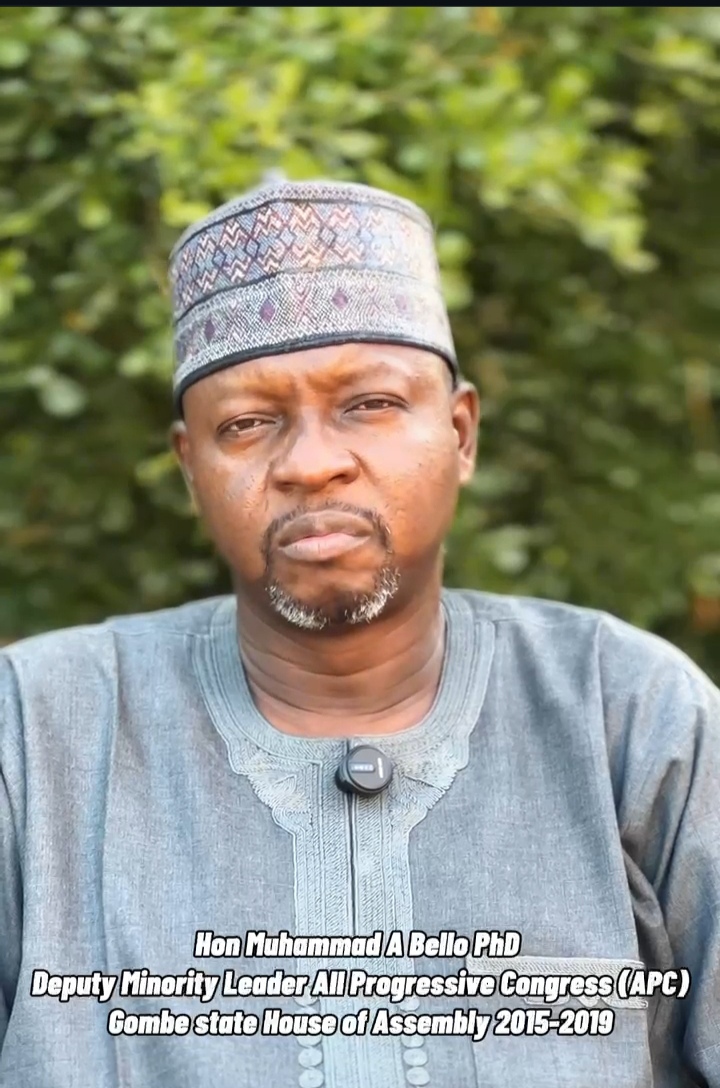
By Editor Daily Facts
In a major political development that could shake up the local political landscape in Gombe State, Hon. Muhammad A. Bello, PhD, former Deputy Minority Leader of the Gombe State House of Assembly (2015–2019), has formally resigned his membership from the All Progressives Congress (APC).
In a resignation letter dated August 4, 2025, and addressed to the APC Chairman of Bolari East Ward, Gombe Local Government, Dr. Bello cited “personal reasons” for his decision to leave the ruling party. The letter, which has since gone viral within political circles in the state, marks the end of an era for a politician widely regarded as one of the founding pillars of the APC in Gombe South.
> “This is to officially tender my resignation from the All Progressives Congress (APC) with immediate effect due to personal reasons,” he wrote.
Hon. Muhammad A. Bello was the first lawmaker to represent Gombe South Constituency under the APC platform when the party emerged as a political force in the state. He also served as Deputy Minority Leader during his term in the State Assembly and was later appointed the first Special Adviser on Political Matters to the Governor of Gombe State under the APC-led administration.
In the resignation letter, Dr. Bello expressed his appreciation to the party, saying:
> “I find it imperative to say a big thank you to the leadership and members of the party for the rare opportunity given to me.”
Political Implications
Although Dr. Bello did not disclose his next political move, insiders suggest that his exit from the APC may not be unconnected to ongoing internal crises and shifting alliances within the party structure at both state and national levels. His resignation could also signal a realignment ahead of the 2027 general elections.
Political observers believe that his departure could influence other key stakeholders in the Gombe South axis, especially those who consider him a grassroots mobilizer and voice of political experience in the region.
Attempts to reach APC officials in the state for official comments were unsuccessful as of press time, but party loyalists in Bolari East Ward expressed shock over the development, calling it “a big loss” to the party.
As the political atmosphere continues to heat up in Gombe and across Nigeria, Dr. Bello’s resignation adds to the growing list of notable defections that may reshape the balance of power ahead of future electoral contests.
Politics
Democracy Not for Sale Ralph Nwosu: Former ADC Chairman I Chose Nigeria Over ₦10bn, Three Ministerial Positions
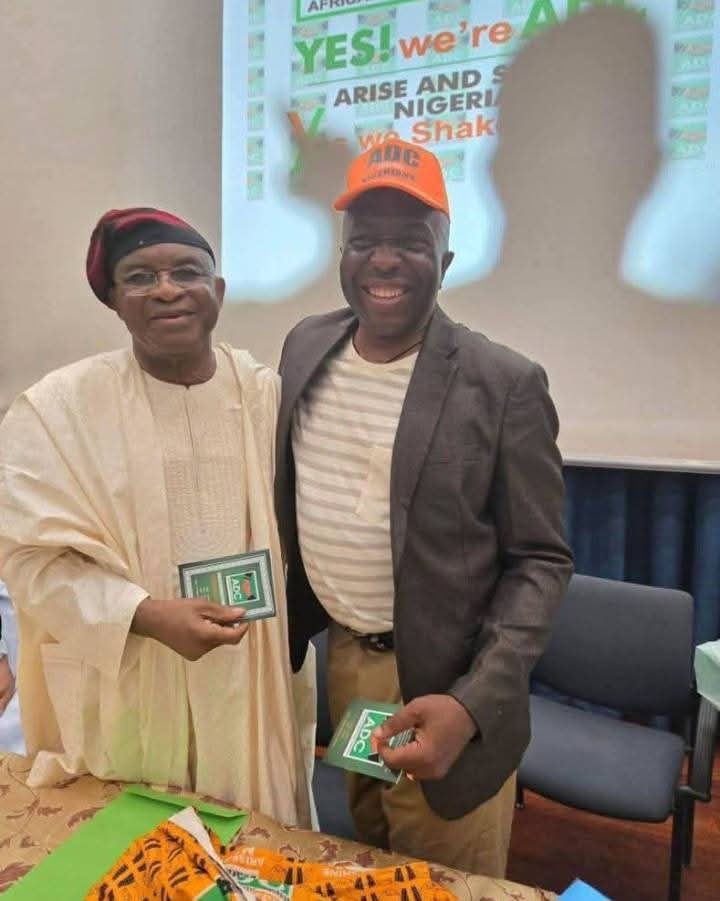
By Our Correspondent
In a dramatic revelation that has sparked national conversation, the immediate past National Chairman of the African Democratic Congress (ADC), Chief Ralph Okey Nwosu, has disclosed that he turned down lucrative offers—including three ministerial slots and a staggering ₦10 billion—in exchange for halting the party’s role as the principal opposition coalition platform in the country.
Addressing newsmen in Abuja on Wednesday, Nwosu stated that despite pressure from powerful political figures and close associates, he made the “difficult but patriotic decision” to prioritize Nigeria’s democratic stability over personal gain.
“I do not want Nigeria to become a one-party state. Even though I was advised by people close to me not to give up my position as National Chairman, I chose Nigeria first,” Nwosu declared.
The former chairman, who led the ADC for over a decade, is credited with transforming the party into a credible third force in Nigerian politics. Under his leadership, the ADC became a strategic platform for a coalition of opposition parties and civil society groups seeking to challenge the dominance of the ruling party.
According to Nwosu, the offer to step down the coalition move came at a critical time when democratic principles in Nigeria were being tested. He described the attempted inducement as part of a larger effort to weaken the country’s multiparty system.
“Today, I am happy as a fulfilled man who is paying the price for a better Nigeria,” he added, visibly emotional.
The Coalition for ADC, a growing alliance of pro-democracy movements, political parties, and stakeholders, has since commended Nwosu for his integrity and sacrifice. Many see his decision as a bold stand against corruption and political manipulation.
Political observers believe Nwosu’s stance has not only preserved the credibility of the ADC but has also inspired a renewed push for a more vibrant and united opposition in the country.
Reactions have begun to pour in from political analysts, civil society groups, and party leaders, with many hailing Nwosu’s action as “historic” and “courageous,” especially in a climate where political compromises are often influenced by personal benefit.
With the 2027 general elections on the horizon, Nwosu’s revelation is expected to energize coalition efforts and encourage broader participation from disenchanted Nigerians seeking credible alternatives.
Politics
I’m Not Running in 2027 Engineer Aliyu Kombat-My Mission Goes Beyond Politics
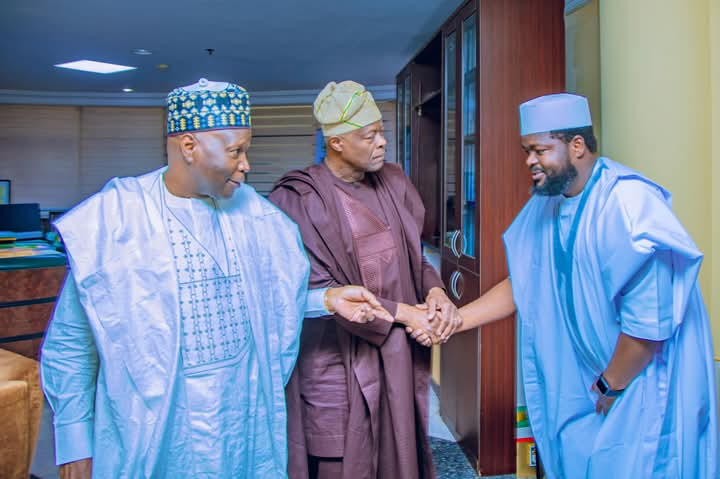
By Our Correspondent
In a heartfelt and reflective press statement released Monday, renowned philanthropist and political figure, Engineer Aliyu Muhammad Kombat, has formally announced his decision not to contest in the 2027 General Elections, despite widespread calls and public encouragement urging him to do so.
Opening his statement with deep gratitude to Almighty Allah and the people of Gombe State, Kombat expressed appreciation for the unwavering support he has received over the years, calling it a “constant source of strength and inspiration.”
“I remain deeply humbled and eternally grateful for the love you have shown me through your words, actions, and persistent belief in my capacity to serve,” he said.
After what he described as “deep reflection and wide consultations with my family, mentors, elders, political allies, and trusted friends,” Kombat revealed that the decision to step aside from the 2027 political contest was not made lightly.
“I acknowledge your disappointment, and I ask for your understanding and prayers,” he said, in a direct appeal to supporters who had anticipated his candidacy.
While stepping back from the electoral race, Kombat made it clear that he remains loyal to the All Progressives Congress (APC) and pledged full support toward the party’s continued growth at all levels.
“I remain firmly committed to the ideals of my party, the APC, and I pledge my total support for the continuous progress of the party at all levels,” he affirmed.
Kombat, who is also the founder of the Velocity Humanitarian Foundation, reassured the public that his withdrawal from electoral politics will not in any way affect the Foundation’s operations.
“That noble initiative remains alive, active, and fully committed to its core mission — delivering compassion, empowerment, and dignity to the most vulnerable in our society,” he said.
The Velocity Humanitarian Foundation has gained regional recognition for its focus on youth empowerment, healthcare outreach, educational support, and food security initiatives, especially in underserved communities across Gombe State and beyond.
In closing, Kombat left the door open for future political engagement, stating:
“Should the future present another opportunity to serve, under compelling and unavoidable circumstances, I will answer that call with the same spirit of duty and sacrifice that has always guided me.”
As reactions pour in across political and civil society circles, many have praised Engineer Kombat for his humility, sincerity, and unwavering commitment to humanitarian work, even outside of the political spotlight.
The statement has already begun generating wide interest across political and civic platforms in Gombe and beyond, with many describing it as a “rare act of selfless leadership in today’s political climate.”
END
-
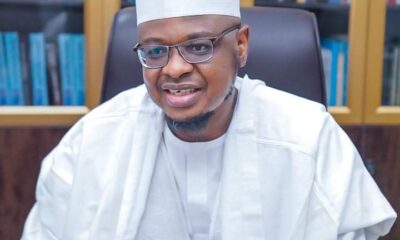
 Leadership12 months ago
Leadership12 months agoBreaking: African Union Appoints Pantami as Co-Chair of the 4th Industrial Revolution Policy Council
-

 Politics1 year ago
Politics1 year agoFormer Gombe State APC Promoters Forum Chairman Attacked Following Political Commentary
-
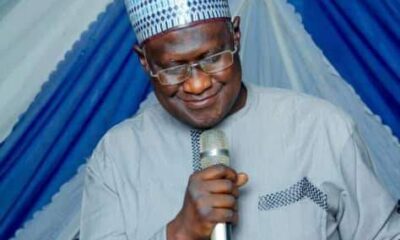
 Appointment10 months ago
Appointment10 months agoGombe State Indigene, Appointed New Vice Chancellor (ATBU)
-
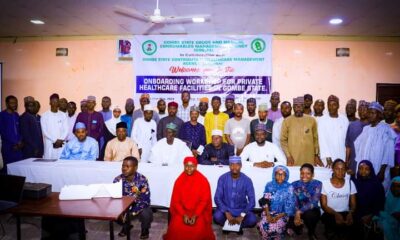
 Health1 year ago
Health1 year agoGombe State Organizes Onboarding Workshop for Private Healthcare Facilities
-
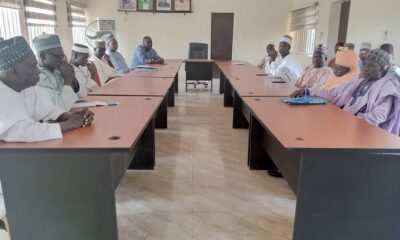
 Water1 year ago
Water1 year agoGombe Government Mobilizes Stakeholders to Combat Illegal Water Connections
-
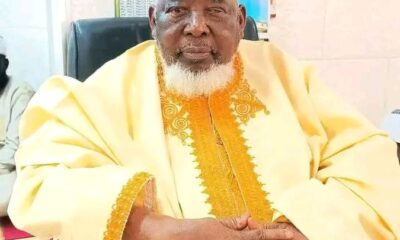
 Death5 months ago
Death5 months agoProminent Nigerian Islamic Scholar, Sheikh Sa’idu Hassan Jingir, Passes Away
-
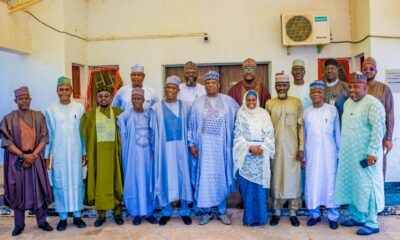
 Politics1 year ago
Politics1 year agoGombe State Inaugurates Human Capital Development Council
-
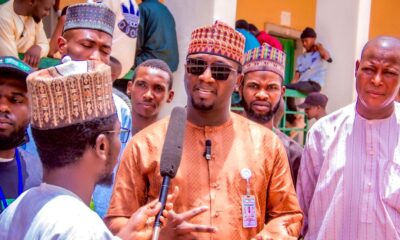
 Politics1 year ago
Politics1 year agoGombe State Launches Presidential Palliative Program (PPP) to Aid Small Businesses
